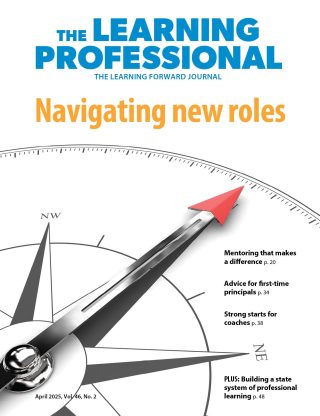FOCUS
Teach, Watch, Learn
Early education program pairs college courses with video coaching
By Alan Cohen
August 2017
Vol. 38 No. 4
Read the remaining content with membership access. Join or log in below to continue.
Sed ut perspiciatis unde omnis iste natus error sit voluptatem accusantium doloremque laudantium, totam rem aperiam, eaque ipsa quae ab illo inventore veritatis et quasi architecto beatae vitae dicta sunt explicabo. Nemo enim ipsam voluptatem quia voluptas sit aspernatur aut odit aut fugit, sed quia consequuntur magni dolores eos qui ratione voluptatem sequi nesciunt. Neque porro quisquam est, qui dolorem ipsum quia dolor sit amet, consectetur, adipisci velit, sed quia non numquam eius modi tempora incidunt ut labore et dolore magnam aliquam quaerat voluptatem.
Alan Cohen (alan@thrivewa.org) is president and CEO of Thrive Washington, the state’s lead nonprofit partner in advancing high-quality early learning.
References
Committee on the Science of Children Birth to Age 8: Deepening and Broadening the Foundation for Success. (2015.) Transforming the workforce for children birth through age 8: A unifying foundation. Washington, DC: The National Academies Press.
Darling-Hammond, L. (2000.) Teacher quality and student achievement: A review of state policy evidence. Education Policy Analysis Archives, 8(1).
National Survey of Early Care and Education Project Team. (2013). Number and characteristics of early care and education (ECE) teachers and caregivers: Initial findings from the National Survey of Early Care and Education (NSECE). OPRE Report #2013-38. Washington, DC: Office of Planning, Research and Evaluation, Administration for Children and Families, U.S. Department of Health and Human Services.
Whitebook, M., Austin, L.J.E., Ryan, S., Kipnis, F., Almaraz, M., & Sakai, L. (2012). By default or by design? Variations in higher education programs for early care and teachers and their implications for research methodology, policy, and practice. Berkeley, CA: Center for the Study of Child Care Employment, University of California, Berkeley.
Recent Issues
LEARNING DESIGNS
February 2025
How we learn influences what we learn. This issue shares essential...
BUILDING BRIDGES
December 2024
Students benefit when educators bridge the continuum of professional...
CURRICULUM-BASED PROFESSIONAL LEARNING
October 2024
High-quality curriculum requires skilled educators to put it into...
LEARNING TO PIVOT
August 2024
Sometimes new information and situations call for major change. This issue...












